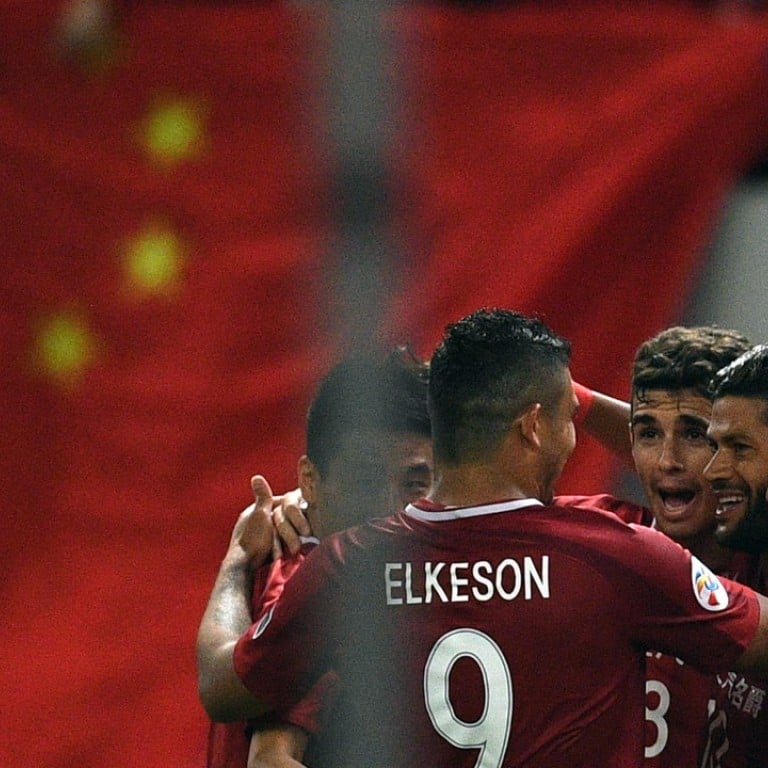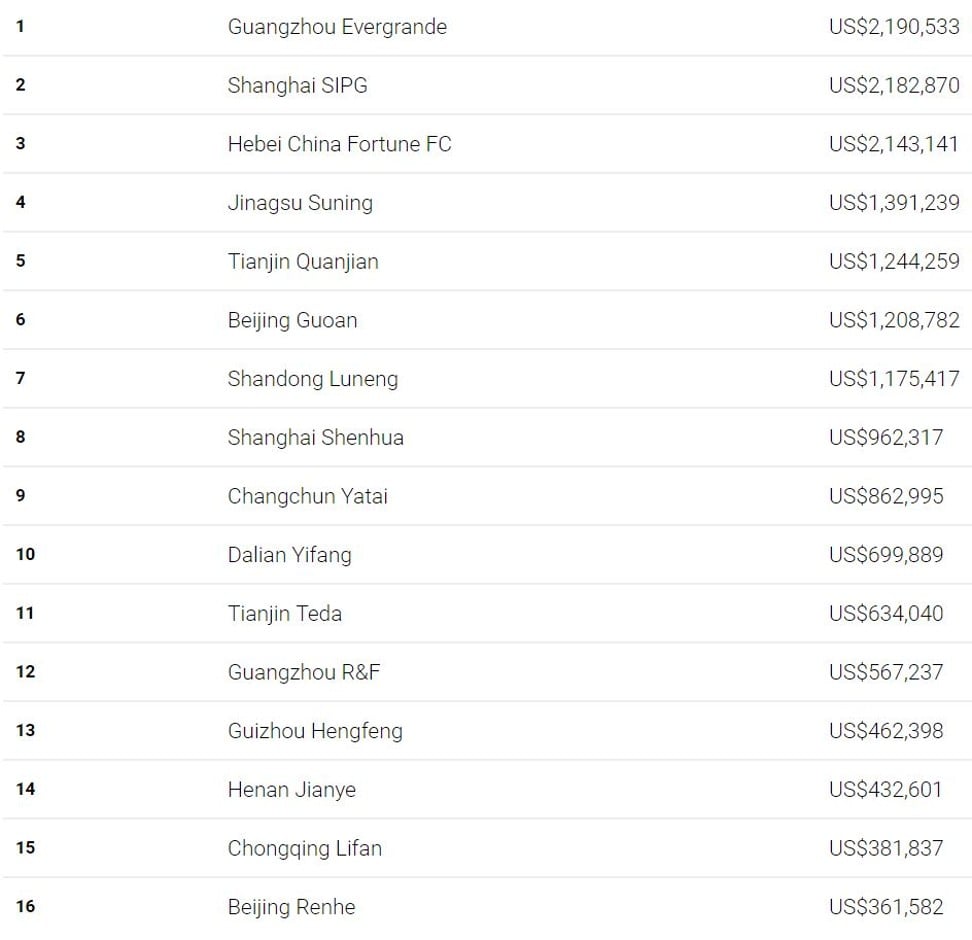
Chinese Super League clubs outspending MLS, AFL, J. League and SPL but money not buying success ahead of salary cap
- Top 10 per cent of earners account for 67 per cent of spending
- Widest disproportion of any of leagues analysed in new survey
This figure makes it the 11th highest-spending league ahead of Major League Soccer in the US, Japan’s J. League, the AFL and the Scottish Premier League.
However, in contrast to the theory posited by Simon Kuper and Stefan Szymanski in Soccernomics, their outlay on paying players does not correlate to league success.
The 2018 league table, if it was decided solely by wage spending, would look very different.
In contrast, Tianjin Quanjian and Hebei China Fortune have disappointed compared to their outlay on salaries and bonuses.
Further down the table, lowest spender Beijing Renhe and Chongqing Lifan above them will have been happy not to have been relegated, whereas ninth-highest spenders Changchun Yatai and 13th-ranked spenders Guizhou Hengfeng will be disappointed to go down.
Combined, the Chinese Super League sits eighth on earnings per game – the 30-game season working favourably for its players – at US$34,272 per game on average.
Some of those players are rewarded much more handsomely than others and this spending is driven by the clubs’ foreign stars. The survey reports that the top 10 per cent of earners account for 67 per cent of total wages, the widest disproportion of any of the leagues analysed.
That is understandable when some of those players are reported to be among the best-paid in world football.
The Chinese Super League wage table
Forbes have Oscar as one of the 100 highest earning athletes on their annual list for 2018. There are eight footballers among the 100 top earners and the Brazilian is the sixth best-paid among them, including endorsements, but his basic salary and winnings is more than fifth-best paid player Paul Pogba.
Oscar’s teammate Hulk is said to earn US$320,000 per week, some of which he has spent on a private jet with his face and signature emblazoned on it.
In fairness, the pair were crucial to Shanghai SIPG’s title win, Oscar leading the assists chart with 18, plus 13 goals – a total Hulk matched while laying on another 15 goals.
The same is not true at Hebei who pay similar wages to Ezequiel Lavezzi and Javier Mascherano, while Graziano Pelle’s weekly wage raises the average of the already low-spending Shandong.
Guangzhou Evergrande moved from 179th biggest spenders in 2017 to 163rd of the 345 teams surveyed – and it is worth bearing in mind this figure does not include the wages of a staff headed by Fabio Cannavaro, the best-paid manager in the league.
Meanwhile, Champions Shanghai SIPG dropped from 151st in 2017 to 165th this year. Seven of the teams saw their ranking rise over the year, with seven seeing a drop over the course of the year and the other two teams – 10th-highest spender Dalian Yifang and lowest spender Beijing Renhe – newly promoted.
Chinese clubs have outspent some of the biggest names in global sports along the way.
Guanghzou Evergrande spend more than the Montreal Canadiens of the NHL, while Shanghai SIPG outspent English Premier League Newcastle United.
Hebei China Fortune FC, who finished seventh in the 2018 season, were China’s third-highest spending club.
The teams they outspend include EPL side Burnley, Major League Baseball’s Oakland Athletics and the NHL’s Vancouver Canucks, as well as European football big names Lyon, Lazio and Monaco.
Fifth-placed Jiangsu Suning have a wage expenditure larger than newly-promoted English Premier League side Cardiff City, while even ninth-highest spending Shandong Luneng spend more than perpetual Scottish Premier League champions Celtic.
Shanghai Shenhua outspend Toronto FC and a number of sides in Spain’s La Liga, while Changchun Yatai spend more than Zlatan Ibrahimovic’s LA Galaxy.
Tianjin Teda, meanwhile, spend more than Steven Gerrard’s Glasgow Rangers, while Guangzhou R&F outspend MLS newcomers LAFC.
Relegated Guizhou Hengfeng spent more than the Seattle Sounders, with fellow strugglers Henan Jianye outspending Montreal Impact and J. League side Nagoya Grampus Eight.
Most maddening is Chongqing Lifan outspending 2017 AFC Champions League winners Urawa Red Diamonds and the favourites to win the MLS playoffs this season, Atlanta United.
Even the lowest-paying CSL team, Beijing Renhe, is outspending fellow MLS final hopefuls Portland Timbers and Wayne Rooney’s DC United, as well as the winners of this year’s AFC Champions League, Kashima Antlers, a team that is definitely getting more value from its playing staff.
Next season will see the introduction of a salary cap, which will at the very least reduce spending on wages for domestic players and should see 2019’s average wage decrease.
This new rule follows on from the introduction of a transfer tax ahead of last season, which will remain in place for the 2019 campaign.
These are necessary measures if the Chinese FA is to make sure the members of the CSL are to operate within their means.
Guangzhou Evergrande’s 2017 financial reports showed that they had spent more than US$127 million pounds on wages, a huge factor in their reported loss of more than US$150 million.
That did not prevent them from bringing Paulinho back from Barcelona and fellow Brazilian Anderson Talisca in after the World Cup to help them mount a title defence.
Much like the transfer tax did not put off Beijing Guoan from effectively making Cedric Bakambu the most expensive African footballer in history by paying the transfer tax.
All of these clubs are likely to continue to operate at a loss even with stricter controls in place and it will surely need stricter financial constraints to reach their government-mandated goal.


